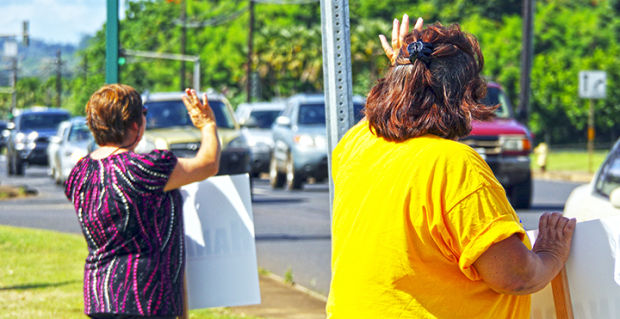LIHUE — A traffic accident that didn’t happen changed the way Rep. James Kunane Tokioka campaigns.
And he wasn’t even driving.
“We were waving at someone who was driving into Lihue,” Tokioka said. “He was not paying attention to the traffic which was backing up because he was smiling at us, and waving. We tried to caution him to slow down, but he was focused on us and not on the road. At the last minute, he slammed on the brakes, swerved off to the side of the road and went up the side of an embankment, nearly flipping over.”
Fortunately, the driver was not hurt.
“He got out of the car, looked at us, and said, ‘Wow! That was close,’” said Tokioka, seeking re-election as a state representative for District 15.
“Since that day, I have never gone out to sign wave. I have gone out to thank unions holding mass sign waving events for their endorsed candidates, but not to sign wave.”
Other candidates and voters share Tokioka’s sentiments. They say the tradition around election season may be too dangerous for its own good. Some residents also say waving signs doesn’t indicate anything about a candidate’s qualifications and abilities to hold public office, and isn’t a reason to give them your vote.
But come campaign season, the tradition of supporters standing on roadsides, holding signs for their candidates and waving to drivers is common.
Billy DeCosta, a candidate for the Kauai County Council, told the audience at the recent Kauai Filipino Chamber of Commerce forum that he will hold signs for friends running for County Council as a favor, but not for himself.
“It’s dangerous,” DeCosta said. “If I need to wave a sign to get your vote, I don’t need it.”
Tokioka said as far as he is aware, there are no ordinances, or laws governing sign waving, although there are ordinances in place governing placement of campaign signs.
A sign waving campaigner for the late Mayor Bryan Baptiste, Bev Pang, said while conducting sign waving campaigns, she has seen a lot of distracted drivers.
“It’s dangerous,” Pang said. “There are so many people who just don’t want to make eye contact and are distracted. They talk on their cellphones, text, or do anything so they don’t need to see you. Some crouch low behind their steering wheel, but I see you.”
Pang said the experience taught her how to react as a motorist.
“I paint my smile on and think happy thoughts when I drive past sign wavers,” Pang said. “They’re happy, and I’m happy.”
State Sen. Ron Kouchi said there are merits to sign waving, especially for political newcomers.
“When you are new and have no resources, sign waving is an inexpensive way to get your name, and face, out into the public,” Kouchi said. “Sign waving was helpful to me in 1982. Since then, there are other ways to get known through the different social media, and to do it safely.”
He said when he does sign waving, he doesn’t invite his supporters. Instead, he goes out with his wife, Joy, picks a safe spot, even if it means less traffic, and waves.
“You need to get your name out there, but the bottom line is safety first,” Kouchi said.
Tokioka has tailored his campaigns to avoid sign waving.
“What I have done is place a sign at the Gateway Project at the airport and trim the shrubbery on the side of the road,” Tokioka said. “Eddie Sarita initiated that project, and I went out to assist.”
Tokioka said he understands why candidates sign wave.
“It’s an inexpensive way to get your name out there, but for me personally, it is not work the risk of distracting drivers and the chance that the distraction could cause a serious accident,” Tokioka said.





